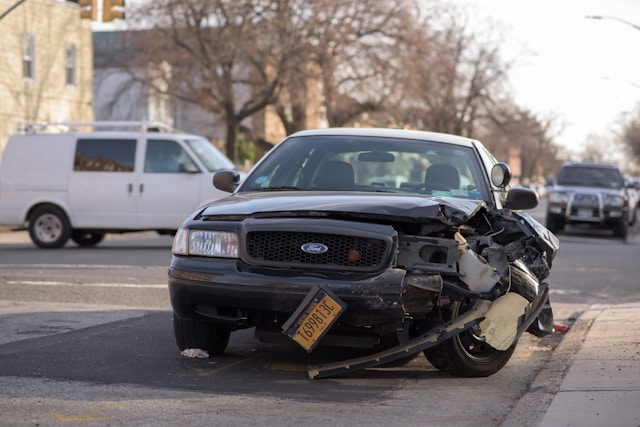Experiencing a car accident is a traumatizing event for anyone, but when children are involved, the stakes are significantly higher. Ensuring the safety and well-being of your children in the aftermath of an accident requires careful and immediate action. The dedicated Savannah car accident lawyers who fight to maximize your settlement share some critical mistakes to avoid after a car accident with your children to help ensure their safety, comfort, and proper legal handling of the situation.

Neglecting Immediate Medical Attention
Mistake: Delaying medical evaluations for your children after a car accident.
Avoidance Strategy: Regardless of the severity of the accident, always seek immediate medical attention for your children. Children might not immediately exhibit symptoms of injuries due to the adrenaline rush, and some injuries, such as concussions or internal injuries, may not be immediately apparent. A thorough medical evaluation can identify and treat these injuries early, ensuring your child’s safety and initiating proper documentation for any potential future claims.
Failing to Properly Document the Accident Scene
Mistake: Not collecting adequate evidence or details about the accident.
Avoidance Strategy: If it’s safe to do so, document the accident scene comprehensively. Take photos and videos of the vehicles involved, the surrounding area, road conditions, traffic signs, and any visible injuries. Make sure to also capture information such as license plate numbers, insurance details, and contact information of witnesses. This documentation is crucial for insurance claims and any potential legal proceedings.
Admitting Fault or Apologizing at the Scene
Mistake: Admitting fault or apologizing immediately after the accident.
Avoidance Strategy: In the chaotic aftermath of an accident, it’s essential to remain calm and avoid making any statements that could be construed as admitting fault. Even an innocent apology could be misinterpreted as an admission of guilt. Instead, focus on gathering information and ensuring the safety of your children. Leave determining fault to the insurance companies and legal professionals.
Overlooking Child-Specific Needs
Mistake: Ignoring the emotional and psychological impact of the accident on your children.
Avoidance Strategy: Children may not fully understand what has happened, but they can still be deeply affected by the trauma of an accident. Address their emotional needs by speaking calmly, reassuring them that they are safe, and encouraging them to express their feelings. Depending on the severity of the accident, consider consulting a child psychologist to help them process the event.
Not Replacing Car Seats
Mistake: Continuing to use the same car seats after an accident.
Avoidance Strategy: Car seats are designed to absorb impact to protect your children during a crash, but they may not be as effective after an accident. Even if the car seat looks undamaged, it’s best to replace it. Many car insurance policies cover the cost of replacing child car seats, so check with your insurer for details.
Delaying Contacting an Attorney
Mistake: Not consulting a personal injury attorney soon after the accident.
Avoidance Strategy: Consulting with an experienced personal injury attorney can provide invaluable guidance through the complex process of filing insurance claims, negotiating settlements, and pursuing legal action if necessary. An attorney can help ensure that you receive fair compensation for medical bills, emotional distress, and other damages related to the accident.
Failing to Report the Accident to Your Insurance Company
Mistake: Not informing your insurance company about the accident promptly.
Avoidance Strategy: Report the accident to your insurance company as soon as possible, even if you believe the other driver is at fault. Providing timely and accurate information can help expedite the claims process and avoid potential disputes down the road. Be sure to give a factual account of the incident and provide any documentation you’ve gathered.
Ignoring Follow-Up Medical Care
Mistake: Not adhering to recommended follow-up medical care for your children.
Avoidance Strategy: Follow through with all medical appointments, treatments, and therapies recommended by healthcare providers. Ignoring follow-up care could result in untreated injuries and complications. Maintaining detailed medical records of your child’s treatment is also crucial for insurance claims and any legal actions you may pursue.
Settling Too Quickly with Insurance Companies
Mistake: Accepting the first settlement offer from an insurance company.
Avoidance Strategy: Insurance companies often aim to settle claims quickly and for the lowest possible amount. It’s essential to fully understand the long-term implications of your child’s injuries and the total costs involved before accepting any settlement. Consult with your attorney to determine if the settlement offer is fair and sufficient to cover all present and future expenses.
Not Keeping a Detailed Record
Mistake: Failing to keep comprehensive records of all related expenses and experiences.
Avoidance Strategy: Keep detailed records of all medical bills, travel expenses for medical appointments, lost wages due to time off work, and any other out-of-pocket costs related to the accident. Additionally, document the emotional and psychological impact on your children, noting any behavioral changes or difficulties they experience post-accident. These records can be crucial for substantiating your claims and ensuring fair compensation.
While navigating the aftermath of a car accident involving your children can be overwhelming, avoiding these common mistakes can help protect their health, well-being, and your legal rights. Prioritize medical attention, document everything comprehensively, consult with a personal injury attorney, and ensure ongoing care and emotional support for your children. Taking these steps will not only provide the best possible outcomes for your children’s recovery but also safeguard your family’s interests in the challenging times following an accident.
















Add Your Comment